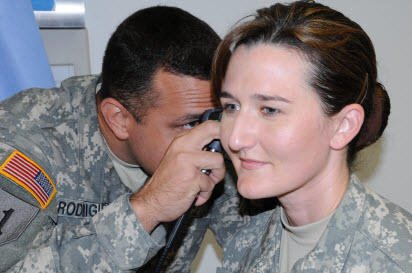Memorial Day is the traditional kickoff of summer, but for TRICARE beneficiaries in the western U.S., this season will bring more than barbecues and trips to the beach.
In July, government officials will decide which of two warring insurers will begin delivering TRICARE West services starting next year. And although there's no love lost between the two firms -- Phoenix-based TriWest and Minnesota-based UnitedHealthcare -- officials with both companies said TRICARE beneficiaries shouldn't worry about what will happen to them. Unless, they argued, their rival winds up with the contract.
In March, the Defense Department awarded next year's TRICARE West contract to UnitedHealth after having used TriWest for all 16 years there's been a regional system. TriWest challenged the award, arguing that it submitted a lower bid and that DoD officials had not taken into account what TriWest calls UnitedHealth's poor past performance.
UnitedHealth says DoD's award speaks for itself, and reflects the "total value" it can provide with its network and the "private sector innovations" it will bring to TRICARE.
Meanwhile, the dispute has sparked worry among many beneficiaries: Will they have to switch doctors? Will the paperwork be a nightmare? Will UnitedHealth understand the implications that go along with serving servicemembers and their families?
There are no definite answers. But in the remaining weeks before the Government Accountability Office is expected to make its ruling, TriWest has launched an aggressive public relations campaign against UnitedHealth, appealing to its members, the press and anyone else it can. In Washington, it blanketed the Pentagon's Metro stop with billboards accusing UnitedHealth of poor past performance, urging riders to "save military healthcare."
TriWest CEO Dave McIntyre told Military.com that he believes DoD made a mistake, and that his company has sent GAO more than 150 pages of "substance."
"There's a fair amount of information here," McIntyre said. "We don't believe in throwing things against the wall for effect."
DoD scored the company's bids in such a way that "several hundred million dollars was not included in their math," McIntyre argued, and it also did not appropriately advantage TriWest's record as a TRICARE vendor and penalize what he called UnitedHealth's troubled history.
"When the [American Medical Association] has issues with how you pay providers, both in terms of timeliness and accuracy, and that results in lawsuit from AMA that you end up settling, that's very substantive," McIntyre said. "Not paying attention to parallel issues of past performance seems inappropriate … you'd expect it in the weapons area, you'd expect it for body armor -- we're not talking about paperclips and pencils here."
Military.com requested an interview with McIntyre's counterpart, UnitedHealth Military & Veterans Services CEO Lori C. McDougal, but she declined. However, company spokesman Matt Stearns did speak at length to respond to the criticisms of UnitedHealth and to reassure TRICARE West beneficiaries they have nothing to worry about.
"When the DoD looked at overall value that a payer would bring to TRICARE West program, they focused on UnitedHealth's large network and private sector and technology," Stearns said.
UnitedHealth has more than 38 million customers in the U.S., Stearns said in an attempt to match McIntyre blow for blow: The company has been ranked first in "claims processing accuracy" by the selfsame AMA; it's "number one" in employer satisfaction, according to J.D. Power and Associates; and it's "the most admired health insurer," according to Fortune, he said.
What about the doctor and transition issues?
"I'm not sure if I can speak specifically about what doctors are in TriWest's network versus ours at this point in time, but I can say we have by far the largest provider network," Stearns said. "And UnitedHealthcare manages large-scale transitions regularly; it's one reason we 're successful and continue to be successful. Our customers recognize our ability to minimize disruptions to their employees through the systems and functions we've put in place."
But there's something beyond just technical performance as a TRICARE vendor: Beneficiaries told Military.com they prized TriWest's partnerships with organizations such as the USO, Fisher House, Operation Homefront and other groups that help troops and their families.
McIntyre called this another key advantage for TriWest -- its appreciation for the special character of its customer base.
"That may have earned us a different reputation in the eyes of some," he said. "Everyone in their work earns a reputation, and we're privileged to do this business because it carries with it a high privilege."
Stearns said UnitedHealth is already a good corporate citizen, and it would apply its same principles to the TRICARE business if it takes over the contract next March.
"Absolutely," he said. "100 percent. UnitedHealthcare is absolutely committed to being a partner with the military community and to being a citizen of the military community."
The company has joined a coalition of big U.S. firms who've committed to hiring 100,000 veterans; it's part of the military spouse employment partnership, the Wounded Warrior Project; and it's the primary sponsor of Ride 2 Recovery, a recovery and rehab cycling program for veterans.
"What this shows is we already, as a general practice, are committed to vets and servicemembers, and you'll be sure to see UnitedHealthcare participation in the life of the military beyond simply our work as the TRICARE West contractor," Stearns said.
About the only thing the companies might agree on are the lopsided stakes: UnitedHealth, a corporate behemoth ranked 22nd on the Fortune 500, would survive if it did not keep the TRICARE West contract. TriWest -- which was created specifically to be a TRICARE provider at the start of the regional system -- probably will not.
"Were we not to be successful, our owners would have to make a decision, but it likely would be not be doing this business in the future," McIntyre said.


























